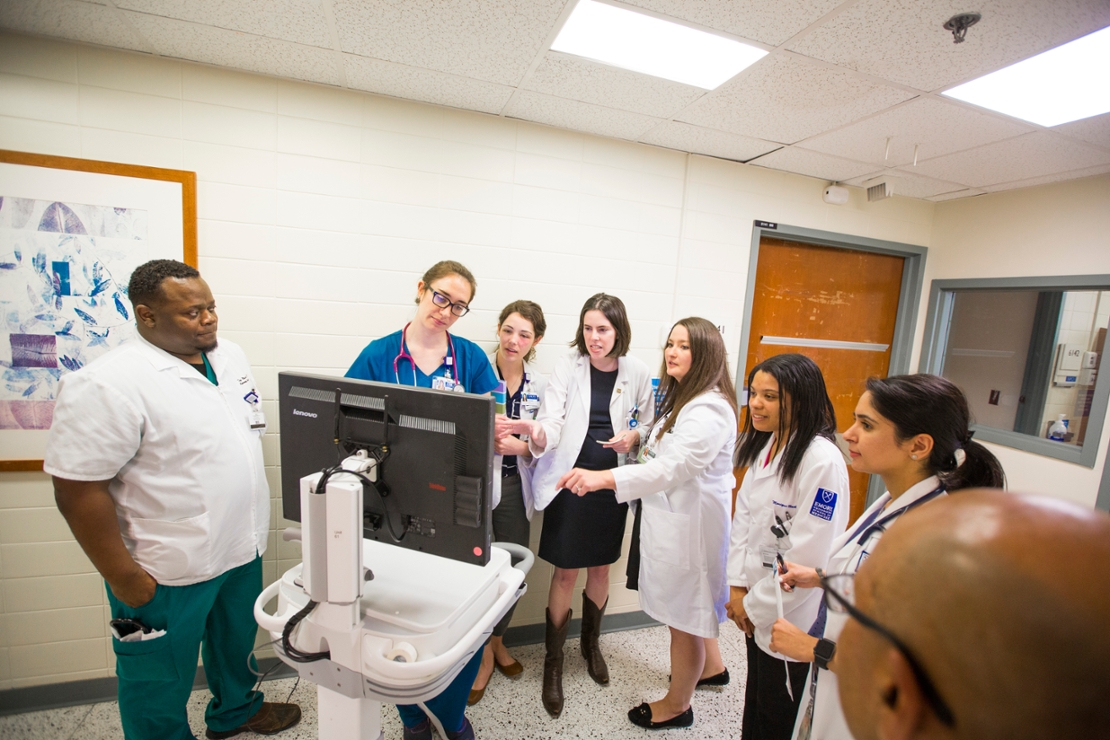Emory's Categorical Residency Track attracts residents who are interested in becoming excellent clinicians and future leaders in internal medicine and subspecialties. This track produces outstanding internists. Roughly half of our graduates enter careers in general internal medicine, hospital medicine, or research, while others pursue further subspecialty medicine training.
Program Overview
Emory's internal medicine residency program utilizes a standardized set of experiential clinical rotations over three years. It also includes frequent and timely educational and scholarly mentoring by residency leadership.
Thousands of categorical track graduates practice across the globe in diverse careers that span academic practice, community practice, hospital medicine, international health, public health, research, and subspecialty practices in all major subspecialties.
Our categorical problem is designed on an X+Y/block schedule, with 4 weeks of inpatient and subspecialty rotations (X block), followed by 1 week of ambulatory and continuity clinic (Y block).
In our curriculum, some MICU rotations are 12-hour shifts while others are scheduled as 24-hour calls + up to four hours for transitions of care; there is a 24-hour APP and fellow coverage in each of the ICUs as well. Interns on select ward rotations stay in-house to provide supervised overnight cross-cover every 12th night. All other night admission and cross-cover duties in our system are covered with night float systems.
PGY-1: Foundational Clinical Experiences
Program interns are immersed in patient care through diverse clinical experiences in our four-hospital system. Through ward, ICU, and consult experiences in both inpatient and outpatient settings, our interns acquire a robust core knowledge base and skill set, and establish a framework for a rational, systematic approach to the care of internal medicine patients.
PGY-2: Subspecialty Practice and Scholarship
The second categorical program year is designed for our residents to gain a deeper understanding of the medical subspecialties. It includes intensive tertiary and quaternary experiences such as heart failure, MICU, specialized HIV care, and many others. In this year, our residents also take steps toward leadership on wards teams and consultative services, and begin tailoring their training toward their career goals, including research, global health, and other scholarship options.
PGY-3: Leadership, Preparation for Independent Practice, and Beyond
The program's third year is designed for residents to consolidate their leadership, supervisory, consultation, and teaching skills to prepare for the next steps in their careers. Residents round out their internal medicine curriculum with subspecialty consult rotations. Residents are also preparing scholarly work for publication or traveling to present their work at scientific meetings. Senior residents are strategically placed at sites that promote increasing autonomy and responsibility for patient care and team leadership.
Rotations Include:
|
Rotation (weeks) |
PGY1 |
PGY2 |
PGY3 |
|
Medicine Wards |
18-22 |
8 |
7-9 |
|
Hurst Cardiology Wards |
4 |
0 |
0 |
|
ICU |
3-6 |
7-10 |
4-6 |
|
Night Float |
0 |
6 |
5-7 |
|
Subspecialty Consults* |
4-6 |
0 |
8 |
|
Emergency Room |
0 |
2 |
0 |
|
Palliative Care |
2 |
0 |
0 |
|
Procedure/Point of care Ultrasound |
1-2 |
Opportunity for elective |
Opportunity for elective |
|
Special Immunology Service (SIS) |
0 |
4 |
0 |
|
Inpatient Selective |
0 |
4 |
0 |
|
Hematology |
0 |
0 |
2 |
|
Neurology |
0 |
0 |
4 |
|
Elective (Research or Clinical) |
0 |
5-6 |
4 |
|
Global Health Distinction** |
0 |
4 |
4 |
|
Ambulatory*** |
10 |
10 |
10 |
|
****Inpatient Selectives |
|
|
|
*Subspecialty consults includes Gastroenterology, Nephrology, Infectious Diseases, and Pulmonology.
**These experiences are for residents completing the global health distinction.
***Ambulatory: Ambulatory weeks (Y weeks) include continuity clinic with panel management and protected administrative time, ambulatory subspecialty clinic experiences (GROE: Geriatrics, Rheumatology, Oncology, and Endocrinology and longitudinal experiences with faculty in your subspecialty of choice), with core didactics and opportunities for distinction work.
****Inpatient Selectives include opportunities like advanced heart failure, infectious disease transplant, hepatology transplant, and bone marrow transplant


